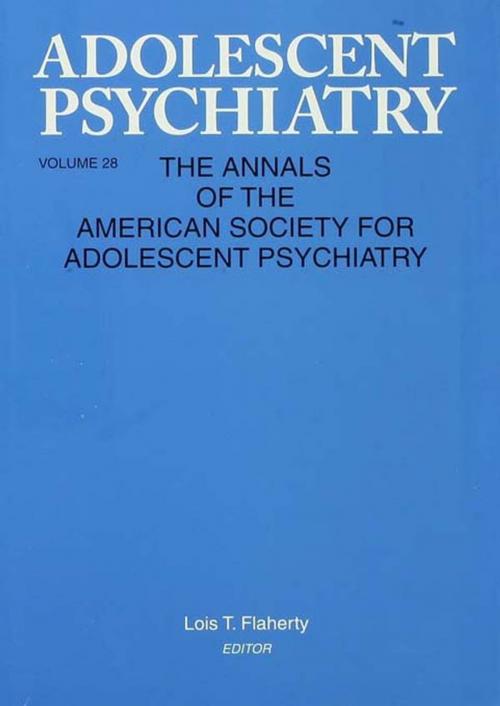Adolescent Psychiatry, V. 28
Annals of the American Society for Adolescent Psychiatry
Nonfiction, Health & Well Being, Psychology, Child & Adolescent, Adolescent Psychology, Child Development, Mental Health| Author: | ISBN: | 9781134911332 | |
| Publisher: | Taylor and Francis | Publication: | May 13, 2013 |
| Imprint: | Routledge | Language: | English |
| Author: | |
| ISBN: | 9781134911332 |
| Publisher: | Taylor and Francis |
| Publication: | May 13, 2013 |
| Imprint: | Routledge |
| Language: | English |
The ASAP's longstanding advocacy of troubled adolescents gains expression in Volume 28 of Adolescent Psychiatry, which focuses on the juvenile justice system and other dimensions of adolescents and the law. A special section on the forensic and legal aspects of adolescent psychiatry traverses the competence of adolescents to consent to treatment; the "voluntary" hospitalization of adolescents; the utility of residential treatment programs in the management of juvenile delinquency; and Richard Ratner's Schonfeld Lecture, "Juvenile Justice?" The special demands on psychiatric providers are addressed in Richard Rosner's proposal for the legal regulation of the practice of adolescent psychiatry and Alan Tuckman's and Dominic Ferro's consideration of professional liability and malpractice in adolescent psychiatry.
The treatment challenges addressed in Part II are complementary to the focus on the legal aspects of clinical work with adolescents. Contributors address the impact of adolescent hostility on the therapeutic process; the evaluation of teenagers who make threats in school settings; the evaluation and treatment of boys who have been sexually abused by clergy; the psychotherapy of learning-disabled adolescents; and the assessment and treatment of juveniles who commit sex crimes.
Volume 28 concludes with two chapters that underscore the ASAP's commitment to timely consideration of the relations among culture, development, and psychopathology. Eugenio Rothe offers a comprehensive overview of Hispanic adolescents and their families and then develops practical guidelines on therapeutic approaches to Hispanic adolescents. And Max Sugar, building on previous examinations of the effects of military experience on late-adolescent males, develops a new conceptualization, "warrior identity problem," to explain the postmilitary adjustment problems of certain young male soldiers and the psychopathology observed in some veterans.
The ASAP's longstanding advocacy of troubled adolescents gains expression in Volume 28 of Adolescent Psychiatry, which focuses on the juvenile justice system and other dimensions of adolescents and the law. A special section on the forensic and legal aspects of adolescent psychiatry traverses the competence of adolescents to consent to treatment; the "voluntary" hospitalization of adolescents; the utility of residential treatment programs in the management of juvenile delinquency; and Richard Ratner's Schonfeld Lecture, "Juvenile Justice?" The special demands on psychiatric providers are addressed in Richard Rosner's proposal for the legal regulation of the practice of adolescent psychiatry and Alan Tuckman's and Dominic Ferro's consideration of professional liability and malpractice in adolescent psychiatry.
The treatment challenges addressed in Part II are complementary to the focus on the legal aspects of clinical work with adolescents. Contributors address the impact of adolescent hostility on the therapeutic process; the evaluation of teenagers who make threats in school settings; the evaluation and treatment of boys who have been sexually abused by clergy; the psychotherapy of learning-disabled adolescents; and the assessment and treatment of juveniles who commit sex crimes.
Volume 28 concludes with two chapters that underscore the ASAP's commitment to timely consideration of the relations among culture, development, and psychopathology. Eugenio Rothe offers a comprehensive overview of Hispanic adolescents and their families and then develops practical guidelines on therapeutic approaches to Hispanic adolescents. And Max Sugar, building on previous examinations of the effects of military experience on late-adolescent males, develops a new conceptualization, "warrior identity problem," to explain the postmilitary adjustment problems of certain young male soldiers and the psychopathology observed in some veterans.















